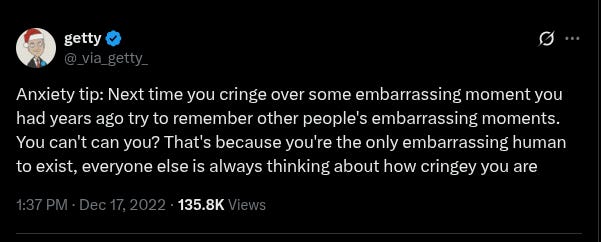“This is just who I am” and “this is an issue I have” sound fairly similar, but lead to potentially vastly different life paths. It's the difference between seeing a characteristic as immutable vs a characteristic we can control, develop, or grow beyond. We see this everywhere in how people describe themselves, blind to their own capability to grow. One of the most overlooked is how we see our own social capabilities. We fall into a mental trap and fail to recognize that being social is a skill that can be developed like any other, rather than an innate gift.
The mechanics of meeting people aren't particularly complex: church, meetups, sports leagues, volunteering all provide opportunities. The real challenge isn't finding opportunities, but addressing our own mental blockers. New activities can be intimidating because no person wants to fail, look incompetent, appear awkward. Even more so when it’s a social interaction. This mentality keeps people in a cycle of avoidance. By recognizing that social interactions are opportunities, even failed interactions, we are able to move beyond our discomfort and become more risk tolerant.
It's important to recognize that most people aren’t paying us much attention. Sure, they do notice us, and yes we should care about our reputations, but we tend to overestimate how much mental energy people spend on the moments when we stumble. You will fumble, you will make mistakes, and chances are that you’ll be able to move beyond those moments. They’ll become nothing more than memories you briefly remember when trying to fall asleep years later.
The thing is those interactions, even the failed ones, are opportunities. They are lessons for us, chances for us to grow. Ways we can learn to pattern off of people with stronger social skills, to recognize what worked, to reflect on what didn’t. Failed interactions aren’t merely moments of discomfort, but chances for us to grow and learn. People who have higher risk tolerance in social interactions generally have better results. They're the person who strikes up conversations and easily handle rejection, the person who is the life of the party, the superglue of social networks. It isn’t just a matter of being socially skilled, but also accepting failure with grace.
An important combination of recognizing that people pay us less attention than we believe, and that social risk-taking pays off, is coming to an understanding that we can reach out to others about social engagements we may not have been explicitly invited to. For those who are undersocialized, they may come to the belief that if they are not explicitly invited to an event they are not welcome. While at times this may be the case (too many people, gender balance, etc.) chances are most of the time the organizers simply didn’t think to. You can and should reach out and inquire whether you can attend an event, or any others in the future. Most of the time people will be quite accommodating.
As you enter social spaces you should be aware that you don’t have to be a passive consumer. Ask hosts if you can help, offer your own space for dinners, plan events yourself. It can be as simple as regularly reaching out to people about happy hours, picnics, or getting coffee. You can and should organize, even if it’s just on a smaller scale. You don’t need to be the super organizer if you don’t want to, there are other opportunities for you to develop your own skills and contribute to a scene. Additionally, this sets up a pattern of reciprocity, which is the glue that binds people together.
That pattern of reciprocity is important because social connections aren’t simply a matter of growing, you must maintain them as well. You can easily have a few close friends one day, and none the next as people’s priorities and locations change. You must build up and contribute to a social network that is robust and can handle people leaving it without collapsing. Don’t rely on a few people to actively maintain a social circle, this can become exhausting for those individuals, and introduce an easy failure mode should those few individuals leave or become overwhelmed with other responsibilities. Help hosts, actively plan as well, bring things to parties (people often overlook this), connect people you believe may get along well. At a certain point you want to go from participant to contributor. Most of life is showing up, yes, but going from participant to contributor is what builds lasting social infrastructure rather than just ephemeral connections.
The running themes here are recognizing one’s own capability to overcome social anxiety, participate, and contribute. To develop social skills and see them as more than immutable characteristics. To reach out to others and build patterns of reciprocity. In a world of collapsing social capital, individuals are yearning for connection, and many others are looking to make connections without knowing where to start. Loneliness isn’t unique. Simply recognizing one's ability to develop social skills and attempting to do so is a major first step. You can do so and be an example for others, just as others have done.
I tried to keep this initial article simple and practical. I decided to write it after a twitter thread I put together a year ago became popular that people still reach out to me about. The link can be found here:
https://x.com/FeralPHunter/status/1784582833110970856




Hell yeah, can't wait to see what else you write.
This was…surprisingly superb. Concise, well-written, and actionable. Well done.